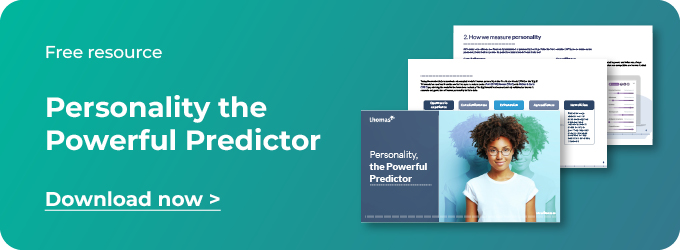You may have heard of the expression, “You’re a Type A personality” but what does it mean? You are going to discover that Type A is just one of four main personality types that can define an individual’s personality.
Understanding this and the other three are key to understanding behaviour and how when managed effectively, you can get the best out of the person and even understand certain workplace behaviours which without any prior knowledge may appear to be difficult to comprehend.
Today we are going to take a look at this personality type and understand in more detail what it means to have a Type A personality. We will get a better understanding of the impact of this behaviour and why understanding this personality type is important in the recruitment process. Finally we will discuss how the Thomas range of tools can help you find out what personality type your candidate has.
What is the Type A personality type?
Type A personalities can be generally summarised as; driven, hard working and determined to succeed. Quick and decisive with a tendency to multitask, the Type A personality is seen as the go-getter and can be forceful with ideas and work ethic creating an overly competitive atmosphere which can intimidate others.
When discussing the Type A personality it can be easy to get carried away with some negative connotations regarding the competitive nature of their behaviour. What is often overlooked is that the Type A personality will work diligently to get tasks completed. They associate self-worth with achievement and this can be often misinterpreted with low self-esteem, on the contrary, handled correctly, it can be used to inspire teams to achieve more.
Goal orientated, risk taker and good under stress the Type A personality will show themselves to be incredibly diligent and hardworking employees and leaders. Sometimes, too hard working with workaholic tendencies and holding high, exacting work standards.
The Type A character is better left working alone rather than in teams, being restricted will have significant adverse effects. You will see many Type A personalities in senior leadership positions - or trying to get there - and even in entrepreneurship roles.
Managing a Type A personality can be difficult if you don’t know how. Being direct, setting goal orientated tasks and reducing stress factors will make their life and the workplace more manageable for everyone in the office.
Type A vs Type B personality
If Type A personalities are seen as the “go-getters” and self value is tied in with achievement, Type B personalities are the more relaxed version of personality type. Importantly, stress levels for Type B personalities are much lower than Type A as well as being less precious about time keeping or placing their self worth in the role that they have.

What it means to have a Type A personality
We have seen what the basic identifiers are when it comes to personality type, but let’s now take a closer look at what it means to have a Type A personality.
Time urgency and impatience
This is when people are painfully aware of time. It could be standing in a queue, waiting for someone or even general impatience waiting for an answer.
Free-floating hostility or aggressiveness
This can be seen as impatience, rudeness, being easily upset over small things, or "having a short fuse". The more you understand that someone has a Type A personality the better you can manage this aspect in the workplace.
Competitiveness
We have already discussed competitiveness, but for Type A personalities it is rooted in a lot of their behaviour towards others. They have to be winners, sometimes at all costs - even if they don’t specifically like or condone cheating or gamesmanship.
Strong achievement orientation
Their position in work, life, and society is strongly correlated to who they are. Their self-worth is rooted in this.
Need for dominance
Being dominant over others, whether in a work environment or in a personal interaction the need to dominate conversation or behaviour is explicit.
Very organised
Hyper-organisation can be a trait of the personality. In order to get as much done as possible, organisation is essential.
Dislikes wasting time
Again, this falls under time impatience. If you are wasting time, the Type A personality sees this as an affront to them.
Have a tendency to multitask
Achievement is the high priority for Type A personalities, so the tendency to multi-task is not lost.
How Type A personalities can impact behaviour in the workplace
Naturally, having any of the four personality types will impact behaviour in the workplace. Understanding the Type A personality you will better understand that the impact can be positive or negative depending on certain triggers and even the types of work that each individual does.
Do you have any team members that struggle with time management? This would be quite troublesome for the Type A personality, especially if they had to report to someone who didn’t consider timekeeping to be important.
What about a relaxed workplace environment? That can have many advantages - even for a Type A personality that needs to reduce stress levels but being too relaxed without engaging some of the more inherent competitive traits can be counterproductive. Turn tasks into goal-orientated achievements and manage expectations better with the Type A personality on what is required.
We see a lot of senior members of organisations, managers and even entrepreneurs have Type A tendencies. The willingness to achieve, put their career before anything else and even that need for dominance is a key to that level of success.
However, it can isolate others. It can make managing teams difficult as it can be hard to create an empathetic working environment or one that also manages to drive others because it can be intense. Understanding how this personality can affect everything else is key.

How to get the best of out candidates and employees with Type A personality
Understanding you have a Type A personality in your candidates or current employees is a great way to start. Importantly though, what you do to best manage these characteristics is going to be the key to success.
Of course, there are positive and negative characteristics of this personality type so how you manage them is important.
Know what the triggers are
Think about some of the things that trigger the behaviour? Time keeping, competitiveness and even hyper-organisation. If you have members of your team that disregard these attitudes or don’t consider how this could affect others, knowing these triggers is important to correctly manage. Don’t place highly disorganised people in the same team with a Type A personality for example, this can cause conflict.
Introduce frequent breaks
One of the most negative character traits about Type A personalities is that they suffer from high stress levels. Managing that stress is essential for getting the best out of them. This could be creating spaces where they can take breaks away from devices and work tasks or it could even be ensuring that they go out for regular walks and are not sat at their computer all day.
Encourage competitiveness but…
Yes, you should encourage competitiveness by making tasks goal orientated but what you shouldn’t do is then create an environment which penalises people if they don’t hit targets. Remember, you have different personality types that need managing and some people take more time or work in very different ways to a Type A. The goals should be focused on the individual or the task that they are on.
Why understanding the Type A personality type is important in hiring decisions
At the interview stage or even in promoting people within the company, knowing that they have a Type A personality is going to be of strategic value. From understanding a candidate’s suitability for a role, to seeing how they would behave with others in the organisation before even having the job is of course of great value.
How you go about assessing personality is equally important. Using tools like the Thomas suite of assessments will make that process easier.
Type A personalities can have many stress related issues and find that they can be quite isolated from work situations because they are determined to get the work done. Knowing that this is the case, you can determine what roles would suit their personality and how you would manage these issues should they arise.
Resolving conflict or tension would also need to be addressed early on. Type A personalities can want to take the lead on projects and even be very demanding of others, establishing the chain of command and managing expectations would lead to better outcomes.
How Thomas assessments measure workplace personality
Thomas’ workplace personality test can be used to help assess and understand a candidates or employee's personality type and wider personality.
Based on the globally recognised and respected 'Big 5' psychological theory, the High Potential Trait Indicator (or HPTI) as we also call it, assesses six core traits (Conscientiousness, Adjustment, Curiosity, Risk Approach, Ambiguity Acceptance and Competitiveness) to help you identify the best candidate for a role and identify leadership potential, adding confidence to your recruitment.
If you would like to learn more about our assessments, please speak to one of our team.





